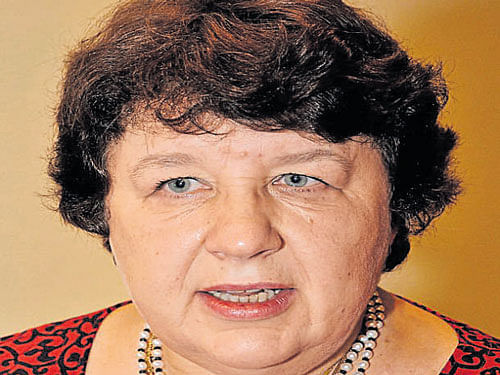You either have to accept India, or reject it. There can be no in-between.” That’s the wisdom that dawned on Irina Bashkirova when she had India almost thrust on her.
Sitting in her official guest room, the serving Consul General of the Russian Federation in Kolkata recalls the time when, as a student at the Moscow Institute of International Relations, she found the study of Hindi imposed on her.
As the daughter of a diplomat, Irina obviously had her aspirations. But learning Hindi was not one of them. All she knew about this “heart-shaped land somewhere down there” was that it had been recently decolonised, and had mangoes, elephants, and films. But when karma beckons, there is no option but to acquiesce. And that’s what Irina did, although destiny did not reveal its plans for her for a long time.
Dream stint
Today, when she reminisces, it all comes together. “I did not immediately pursue the career of a diplomat, she explains, “I married one, and travelled with him on his postings abroad.”
At the time, under the Soviet system women were not quite encouraged to become diplomats, a move she is quick to rationalise by pointing out the family constraints. Yet, as if in preparation for her future role, Irina was fortunate to find work at the ministry when her husband was posted in Moscow. It was in 1995 that Irina was given her first overseas posting as a diplomat in her own right – in Delhi. The breakdown of the USSR into 15 independent states meant that many foreign service personnel had to move on to their native republics, causing a shortfall of cadres in Russia. This automatically necessitated the entry of women into the field.
With her background, education and experience Irina fitted in perfectly. By then she had split from her husband and her daughter had grown up, although her school-going son accompanied her to the Indian capital. “I was the only woman in the embassy when I landed in Delhi,” she shares. No doubt, challenging? She shrugs, laughs softly and continues, “There are all kinds in each field. So here too I found men who were cooperative and others who thought I did not have much to contribute.”
They must have had another thing coming since Irina’s has been a long stint in India – two postings in Delhi, then a posting in Mumbai as the Deputy Consul General and, finally, from 2012, as the Consul General in Kolkata, the first Russian woman to serve in this position.
Charming and humane
While India has had many distinguished women in the foreign service, and the Ministry of External Affairs is presently headed by Sushma Swaraj, Russia is opening up the political and diplomatic space to women now.
So, do women bring that something extra to diplomacy and foreign service? “Definitely,” says Irina, adding, “Women bring a certain charm, which is useful in diplomacy. Yet, they are not simply charming but have an intelligent mind and a solid grounding in the subject. Most tend to have a persuasive quality that can go a long way in pushing an agenda. However, crucially, they bring a certain human angle by dint of their own experience.”
This year marks the 69th year of Indo-Russian diplomatic relations and the 45th anniversary of the signing of the landmark treaty of Peace, Friendship and Cooperation between the two countries, and Irina diligently works towards deepening the bilateral ties.
For Irina, each posting in India has been unique as she was assigned “very challenging tasks”. In the Embassy in Delhi, her major responsibility was promoting humanitarian ties between Russia and India, which included negotiating bilateral agreements, organising cultural events, and facilitating educational and sports exchanges. Work at the Consulate General comprises deepening existing bilateral ties, while helping Russians citizens in this part of India.
Economic disparity
Her understanding of India is enviable, amplified greatly by her knowledge of Hindi. She remarks, “When I first arrived in Delhi in 1995 there were no supermarkets. Within a few years, things have changed dramatically.”
What is it that she likes most about India? “The friendly people,” she says. Another characteristic that Russians and Indians share is the importance accorded to the family.”
What about the women in both countries? According to her, Russian women are more independent than their Indian counterparts. But, in an interesting contrast, she finds many more Indian women in managerial positions than in her own country. Though Russian women enjoy a large degree of individual autonomy, they can learn a thing or two about breaking the glass ceiling,” she says.
